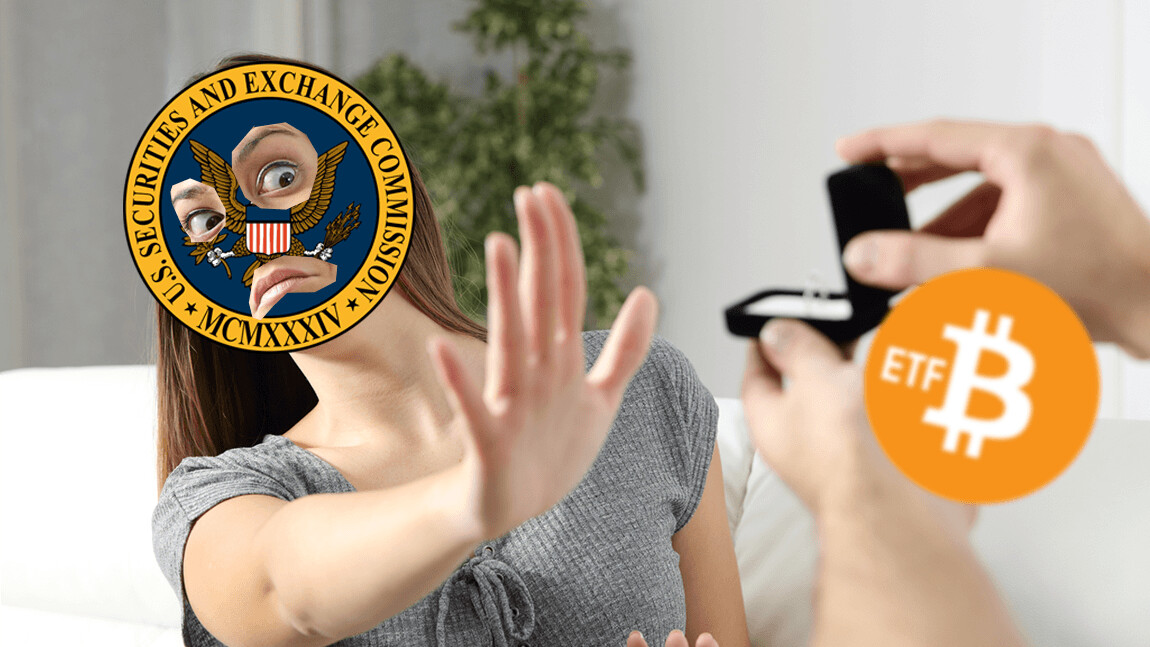
The cryptocurrency industry seems keen on exchange traded funds (ETFs) as the next big milestone to see increased mainstream trading for the digital assets.
Indeed, the US Securities and Exchange Commission (SEC) has received a host of ETF proposals from different companies over the years. Unfortunately, the agency doesn’t seem convinced that cryptocurrencies are ready for ETFs yet.
The Winklevoss twins were the first to file a Bitcoin ETF proposal with the SEC back in 2013. The agency took its sweet time to make a decision, but finally rejected the proposal four years later. A second proposal from the Winlevoss twins was also rejected last month.
The SEC again rejected nine different proposals filed for Bitcoin ETFs earlier this week. It has agreed to review its decision, but as Reuters notes, review of judgement in a previous Bitcoin ETF case led to a three-to-one rejection anyway. So, it’s too soon to get excited about this development. I — for one — am not expecting the SEC to rule in favor of Bitcoin ETFs anytime soon.
The ETF proposals may have been filed with the SEC over a course of five years, but it has reiterated the same reasoning in rejecting all of them — possibility of market manipulation and lack of a regulated market of a significant size. Indeed, these are not just theoretical concerns.
Market manipulation remains one of the biggest worries in the cryptocurrency industry. A very small number of people own very large amounts of cryptocurrencies. According to Bloomberg, it is only 1,000 people (known as “whales” in the community) that own more than 40 percent of the Bitcoin in supply. Satoshi Nakamoto, the anonymous creator of Bitcoin, alone owns approximately 1 million BTC, nearly 5.88 percent of the total Bitcoin in circulation ($6.5 billion).
This is not true for just Bitcoin. In fact, most creators of cryptocurrencies retain a significant portion of the cryptocurrency with themselves. Ripple owns 60 percent of the total XRP supply, Block.one publicly owns 10 percent of all EOS tokens, and all companies raising initial coin offerings (ICOs) typically retain anywhere between 10 and 30 percent of their tokens.
This has led to worries about creators of cryptocurrencies themselves engaging in manipulating the market. Ripple is facing at least three lawsuits currently for accusations of market manipulation and securities law violation.
When you couple this with the paranoia that usually surrounds the cryptocurrency market, it gets worse. The regulation and market uncertainty in the industry means traders react hastily to every news that comes their way.
The Bitcoin’s market sees movement every time in speculation when the defunct cryptocurrency exchange Mt. Gox is about to move its cryptocurrency reserves. As per multiple reports, it was the Mt. Gox’s sell off of more than $400 million worth of Bitcoin between December 2017 to February 2018 that actually dropped the cryptocurrency’s price (a claim that a Mt. Gox. trustee has since denied).
Yet, it is not this apparent manipulation that is the biggest challenge — it is what happens behind the scenes.
Take the case of the controversial USD-backed cryptocurrency Tether, for example. A research conducted at University of Texas at Austin indicated that the sharp increase in the cryptocurrency market in 2017 was caused by market manipulation on part of Bitfinex and Tether. This came months after the US CFTC subpoenaed Bitfinex and Tether in January. A report from Bloomberg also indicated tempering with Tether’s trading on Kraken cryptocurrency exchange desk.
It is evident that at every stage, there are indications of market manipulation with cryptocurrencies. As such, SEC’s concerns are not unfounded. The cryptocurrency community wants Bitcoin ETFs to lend legitimacy, but in truth, it has to be the other way around.
The companies proposing ETFs may themselves be regulated, but the overall Bitcoin industry isn’t. The US government can ensure proper regulation of cryptocurrency within the country, it can’t do so for others. After all, Bitcoin is traded globally without geographical restrictions — even in countries where it is illegal.
It is worth noting that Bitcoin and ETFs are against the essential principles of each other. The fact that Bitcoin is even seeking to enter such a regulated market is a significant change from the initial position of the community not wanting to do anything with governance. And ETFs can’t go along with an anonymous unregulated asset.
But if this change is to come, all cryptocurrencies (not just Bitcoin) have to be regulated globally — not just in the US. Till then, Bitcoin has to make do without ETFs.
Get the TNW newsletter
Get the most important tech news in your inbox each week.




